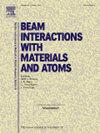Phase and composition analysis of erbium deuteride thin films prepared by magnetron reactive sputtering for proton source target
IF 1.4
3区 物理与天体物理
Q3 INSTRUMENTS & INSTRUMENTATION
Nuclear Instruments & Methods in Physics Research Section B-beam Interactions With Materials and Atoms
Pub Date : 2024-10-30
DOI:10.1016/j.nimb.2024.165558
引用次数: 0
Abstract
This study explores the synthesis and characterization of erbium deuteride (ErDx) thin films using magnetron reactive sputtering (MRS) under varying deuterium gas flow rates. The findings reveal that the stoichiometric ratio of deuterium to erbium (D/Er) can be effectively controlled by adjusting the D2 flow rate, transitioning compositions from ErD2 to ErD3. All films exhibited a cubic structure, with deuterium atoms occupying both tetrahedral and octahedral sites. Compared to the traditional two-step method, MRS-prepared films showed lower oxidation levels and higher preparation efficiency. Proton-source quality evaluation (PQE) confirmed the suitability of these films as high-quality targets. Additionally, this study introduces a rapid IBA method applicable during PQE, offering a non-destructive and cost-effective means to determine the composition within films.
质子源靶用磁控反应溅射法制备的氘化铒薄膜的相位和成分分析
本研究探讨了在不同氘气流率条件下利用磁控反应溅射(MRS)技术合成氘化铒(ErDx)薄膜并对其进行表征。研究结果表明,氘与铒的化学计量比(D/Er)可通过调节 D2 的流速得到有效控制,从而实现从 ErD2 到 ErD3 的成分过渡。所有薄膜都呈现立方结构,氘原子占据了四面体和八面体位点。与传统的两步法相比,MRS 制备的薄膜氧化程度更低,制备效率更高。质子源质量评估(PQE)证实了这些薄膜适合作为高质量靶材。此外,本研究还介绍了一种适用于 PQE 的快速 IBA 方法,为确定薄膜内的成分提供了一种无损且经济有效的方法。
本文章由计算机程序翻译,如有差异,请以英文原文为准。
求助全文
约1分钟内获得全文
求助全文
来源期刊
CiteScore
2.80
自引率
7.70%
发文量
231
审稿时长
1.9 months
期刊介绍:
Section B of Nuclear Instruments and Methods in Physics Research covers all aspects of the interaction of energetic beams with atoms, molecules and aggregate forms of matter. This includes ion beam analysis and ion beam modification of materials as well as basic data of importance for these studies. Topics of general interest include: atomic collisions in solids, particle channelling, all aspects of collision cascades, the modification of materials by energetic beams, ion implantation, irradiation - induced changes in materials, the physics and chemistry of beam interactions and the analysis of materials by all forms of energetic radiation. Modification by ion, laser and electron beams for the study of electronic materials, metals, ceramics, insulators, polymers and other important and new materials systems are included. Related studies, such as the application of ion beam analysis to biological, archaeological and geological samples as well as applications to solve problems in planetary science are also welcome. Energetic beams of interest include atomic and molecular ions, neutrons, positrons and muons, plasmas directed at surfaces, electron and photon beams, including laser treated surfaces and studies of solids by photon radiation from rotating anodes, synchrotrons, etc. In addition, the interaction between various forms of radiation and radiation-induced deposition processes are relevant.

 求助内容:
求助内容: 应助结果提醒方式:
应助结果提醒方式:


